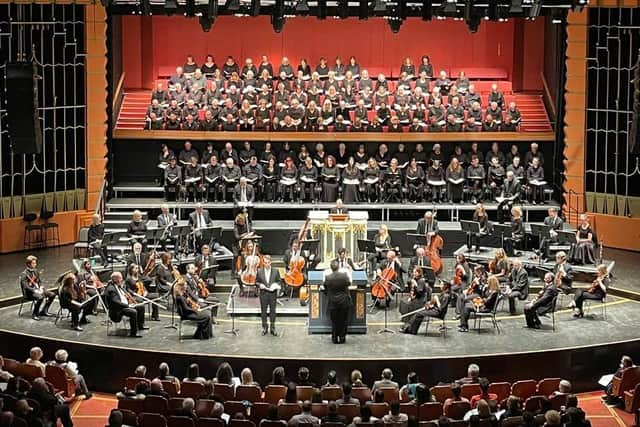Brighton Philharmonic Orchestra soar with great classic
and live on Freeview channel 276
The Brighton Philharmonic Orchestra's performance of Bach's St Matthew Passion, together with the Brighton Festival Chorus last Sunday, was nothing short of extraordinary.
Daunted by the idea of sitting through three hours my doubts were quickly dispelled before the beauty of the music and its presentation by the Brighton Phil, conducted by Robert Howarth. He made his debut last year, much respected by his vast experience with almost any orchestra you care to mention. His style is calm, measured, expressive and using both hands, as though engaging personally with each musician.
Advertisement
Hide AdAdvertisement
Hide AdBach wrote this sacred oratorio in 1727 for solo voices, double choir and double orchestra, with libretto by Picander. He wanted to present the Passion story in music at Good Friday vesper services. The work continues to move audiences nearly three centuries after it was first heard in St. Thomas's Church in Leipzig, Germany.


It tells the story of the last days of Jesus. How he is betrayed, tried, crucified and buried, inspired by Matthew in the Bible, chapters 26 and 27. "When evening came, Jesus was reclining at the table with the Twelve. And while they were eating, he said: "truly I tell you, one of you will betray me." (Ch.26/20). And of course we know it was Judas, in exchange for the thirty pieces of silver.
The orchestra opens with a stirring, soothing introduction followed by the Brighton Festival Chorus - estimated at over 100 strong with mixed voices singing: "Come my daughters, share my mourning."
The Evangelist, sung by tenor James Oxley, takes us through the story, explaining Jesus's progress from arrest to carrying the cross and being nailed onto it. He utters Jesus's final words: "My God, why have you forsaken me?". Oxley is world renowned for his portrayal of Bach's Evangelist.
Advertisement
Hide AdAdvertisement
Hide AdAnd the choir utters Peter's denial. "No, I don't know him," says Peter.
While not knowing the entire Passion, there were some familiar melodies among the recitatives, that helped me 'join in', in a sense. "Erbarme dich" - have mercy oh lord", for instance, sung so movingly by countertenor Patrick Terry, as he came to the front.
To analyse every scene and its meaning would take a mini tome, but suffice it to say the choir and the separate recitatives take us through Christ's arrest, mocking and whippings, torture and final crucifixion. It's gruesome and no sensitivities are spared. Jesus knew he'd be betrayed, and by Judas, a disciple and one of his own best friends.
Our programmes contained the entire libretto in German with English translation. Many in the audience followed the text with the music but I preferred to just listen, picking up the nuances, the recitatives and the excellence of the solo voices.
Advertisement
Hide AdAdvertisement
Hide AdIt was a smaller orchestra, only the instruments needed to embellish the different voice performances: impressive solo cello accompaniments; double bass; soft violins; a remarkably lovely, period-sounding oboe.
The wind sections - four on each side - gave us rich clarinets, flute and brass. The organ gave us sequence and that typical baroque two-note punctuation at the end of a phrase.
Story done. Jesus's suffering is at an end. Pilate's last utterance - "truly this is the son of god."
Jesus's body is laid to rest and all weep beside the tomb. "Rest gently, rest well". And that's where the story ends. He is buried and there is no 'risen' follow up.
Advertisement
Hide AdAdvertisement
Hide AdI can't praise enough the Brighton Philharmonic Orchestra and the Brighton Festival Choir, for a performance that took its place among the best - of an acclaimed work considered one of the greatest ever written. And we came away the richer for it.
Review by Janet Lawrence